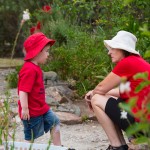We are surrounded by ethics every day in every setting, whether it be a decision or situation. But what about applying ethics in early childhood education and care?

‘I believe children benefit from being around self-respecting adults’—Lilian G. Katz[1]
Ethics is in Australian news. Every day we see reports about the behaviour of individuals and organisations that we had trusted to do the right thing. At the highest levels of government through to the playground, we find that the behaviours of others are not what we hope for or expect. And this affects the whole community whether we are consumers, families, young children or students, worshippers, employees, taxpayers or fellow citizens. This means there is a new level of scrutiny and awareness about behaviour, ethics and responsibility. Organisations find they need to take stock of themselves and the situations that arise in their workplaces and in dealings with clients.
More than ever, new recruits and new entrants to the early childhood sector as well as families of young children are reappraising education and care settings. What does it mean to be ethical when working with families and young children? What does it mean to be part of an ethical team? What do ethics in action look like in early childhood? Is there a professional code of ethics in place? Who do I go to when the situation becomes unclear?
For leaders and managers in the sector, the questions include how do I support my team to understand the ethical dimensions of their practice? Are educators in my team equipped to respond to the many tricky situations that arise every day in an early childhood setting?
Exploration of trust and the workplace by marketing group Edelman (19th Annual Edelman Trust Barometer, 2019) suggests that while big gaps have opened up around the world in the trust that individuals place in organisations and institutions, more people are now looking for reliable sources of information. Many see their employer as a trusted source of information and link a trusted employer with leadership on change and social impact ie contributing to the betterment of society.
Lilian Katz, internationally renowned and much-respected early childhood thought leader, says developing and trusting our own judgement as early childhood professionals is crucial.
‘As teachers, all we have at a given moment in a specific situation is our own very best judgment,’ Katz says. ‘Throughout our professional lives, we study and reflect in order to refine that judgment; we exchange with colleagues, consider others’ solutions to the problems we face, examine the available evidence—all in order to improve our judgment.’[2] But in the last analysis, our very best judgment is all there is’ (Katz, in Rothenberg, 2000, p 394).[3]
The ECA Code of Ethics has been in place since 1988 and has continuously developed over the years, in consultation with sector professionals and experts. The ECA Code of Ethics longevity says a lot about the commitment and professionalism of the early childhood sector that has remained in high demand since it first appeared. The brochures and posters for ECA’s revised Code of Ethics (2016) remains our most requested publication and is high on the list of social media engagement.
Ethics in Action: A practical guide to implementing the ECA Code of Ethics is an easy-to-use and practical guide to the ECA Code of Ethics. Within this practical guide you will discover three main sections, each containing valuable resources for all levels–from emerging educators through to experienced leaders.
Developed from the early learning and care sector’s desire to commit and enact ethics in daily practice you will explore the role of ethics in professional life where you will discover the meaning of ethics, the benefits of a code of ethics, the ethical decision making-cycle and practical examples of how to develop ethical approaches within your setting.
Within the guide you will also find practical tool templates (over 25 pages), these can be shared as talking points in staff meetings to encourage deeper thinking about ethics in practice.
‘This resource will provide practical support for professionals wanting to embed the Code of Ethics into their work with children, families and colleagues’ – Dr Anne Kennedy.
References
[1] 2000, Rothenberg, D. (Ed) p 394, Issues in Early Childhood Education: curriculum, teacher education, & dissemination of information, Proceedings of the Lilian Katz Symposium November 5-7, Catalog no 227, published by Early Childhood and Parenting (ECAP) Collaborative, University of Illinois.
[2] 2000, Rothenberg
[3] 2000, Rothenberg.
ECA Recommends:
Designed especially for early childhood education and care environments, and based on the principles of the United Nations Convention on the Rights of the Child (1991) the ECA Code of Ethics reflects current pedagogical research and practice, providing a framework for reflection about the ethical responsibilities of early childhood professionals who work with or on behalf of children and families in early childhood settings. Learn more about the ECA Code of Ethics.
Ethics in Action — A practical guide to implementing the ECA Code of Ethics
By Dr Lennie Barblett, Catharine Hydon and Dr Anne Kennedy
This easy-to-use practical guide is suitable for all educators, managers, leaders and childhood professionals caring for children from birth to 12 years of age. This essential and practical 95-page guide to the Early Childhood Australia (ECA) Code of Ethics clearly explains what ‘code of ethics’ means in everyday practice. You will discover case studies, scenarios and provocations to help guide you with everyday ethical implementation. Developed from the early learning and care sector’s desire to commit and enact ethics in daily practice, this easy-to-use publication will support you in bringing ethics into action!
Working with the ECA Code of Ethics
Coming from the Greek word ethos meaning ‘character’, the word ethics describes ways of being, thinking and acting based on one’s values and virtues. A code of ethics, by extension, is a set of clearly defined and distinctive values and virtues collectively regarded as important by members of a profession. It includes key statements and commitments that guide professionals on how to act in relation to their work and those they work with.
This course, presented by Catharine Hydon, delves into the ECA Code of Ethics and examines what it means to be ethical. It also explores how early childhood educators can use the code to strengthen relationships with children, families, colleagues, communities and the profession. The course includes interviews with various early childhood educators, showing how they apply the ECA Code of Ethics in everyday situations.













